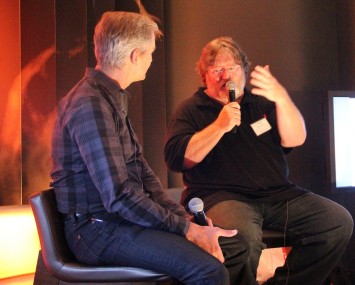Instead Microsoft is working to push gamers to use their Xbox consoles and close the platform. With Windows 8 the PC platform is certainly being closed out. There is simply no way to get around it and Newell puts is best saying “In order for innovation to happen, a bunch of things that aren’t happening on closed platforms need to occur”. Unfortunately what Microsoft wants is a closed eco-system like Apple so they can not only control access into the club, but also develop and continuous
revenue stream (with their cloud services). As an example some games from the Windows Live Game genre will no longer launch because Windows Live will not install. The reason that Windows Live will not install is because it is already a core component of the OS but under a different name and in a different location. This type of thing simply should not be happening in the open world of the PC, but Microsoft is doing this and there is no stopping them now.
When Valve announced the new project to port not only steam, but the games they distribute to Linux we felt it was a contingency plan for if and when Windows 8 failed in the market. It was also a move to make sure that gamers still have an open platform to play their games on without the limitations and restrictions that will quickly following in the new OS. Again we can let Gabe Newell say if for us; “The big problem that is holding back Linux is games. People don’t realize how critical games are in driving consumer purchasing behavior.”
He goes on to say that Windows 8 is a catastrophe (the quote at the beginning of the article) and that he feels that Microsoft is going to hurt OEMs, and destroy the margins on systems. But with their push into Linux territory they will have options to continue and also to allow their customers (gamers) to continue to enjoy their favorite games. Considering the drop in developer interest in Windows 8 and Windows Phone 8 we have a feeling that Microsoft might be looking to put this one behind them as quickly as Windows Vista and Windows ME to operating systems that Microsoft would rather forget ever existed. In both of these they hedged bets on things they thought the consumer wanted while trying to control what you could do with the systems. With Windows 8 we are seeing the same thing happening all over again.
You can read excerpts from the Interview at AllthingsD
Picture credit - AllthingsD
Discuss this in our Forum




